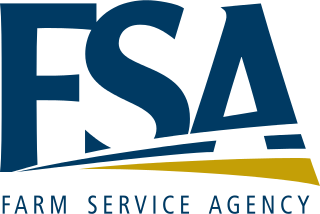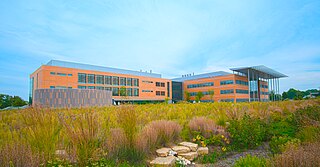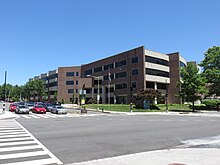
The United States Department of Agriculture (USDA) is an executive department of the United States federal government that aims to meet the needs of commercial farming and livestock food production, promotes agricultural trade and production, works to assure food safety, protects natural resources, fosters rural communities and works to end hunger in the United States and internationally. It is headed by the secretary of agriculture, who reports directly to the president of the United States and is a member of the president's Cabinet. The current secretary is Tom Vilsack, who has served since February 24, 2021.

The Agricultural Research Service (ARS) is the principal in-house research agency of the United States Department of Agriculture (USDA). ARS is one of four agencies in USDA's Research, Education and Economics mission area. ARS is charged with extending the nation's scientific knowledge and solving agricultural problems through its four national program areas: nutrition, food safety and quality; animal production and protection; natural resources and sustainable agricultural systems; and crop production and protection. ARS research focuses on solving problems affecting Americans every day. The ARS Headquarters is located in the Jamie L. Whitten Building on Independence Avenue in Washington, D.C., and the headquarters staff is located at the George Washington Carver Center (GWCC) in Beltsville, Maryland. For 2018, its budget was $1.2 billion.

The Farm Service Agency (FSA) is the United States Department of Agriculture agency that was formed by merging the farm loan portfolio and staff of the Farmers Home Administration (FmHA) and the Agricultural Stabilization and Conservation Service (ASCS). The Farm Service Agency implements agricultural policy, administers credit and loan programs, and manages conservation, commodity, disaster, and farm marketing programs through a national network of offices. The Administrator of FSA reports to the Under Secretary of Agriculture for Farm Production and Conservation. The current administrator is Zach Ducheneaux. The FSA of each state is led by a politically appointed State Executive Director (SED).
The Canadian Food Inspection Agency is a regulatory agency that is dedicated to the safeguarding of food, plants, and animals (FPA) in Canada, thus enhancing the health and well-being of Canada's people, environment and economy. The agency is responsible to the Minister of Health.
The National Nanotechnology Initiative (NNI) is a research and development initiative which provides a framework to coordinate nanoscale research and resources among United States federal government agencies and departments.

The Economic Research Service (ERS) is a component of the United States Department of Agriculture (USDA) and a principal agency of the Federal Statistical System of the United States. It provides information and research on agriculture and economics.
The United States National Agricultural Library (NAL) is one of the world's largest agricultural research libraries, and serves as a national library of the United States and as the library of the United States Department of Agriculture. Located in Beltsville, Maryland, it is one of five national libraries of the United States. It is also the coordinator for the Agriculture Network Information Center (AgNIC), a national network of state land-grant institutions and coordinator for the U.S. Department of Agriculture (USDA) field libraries.

The National Organic Program (NOP) is the federal regulatory framework in the United States of America governing organic food. It is also the name of the United States Department of Agriculture (USDA) Agricultural Marketing Service (AMS) program responsible for administering and enforcing the regulatory framework. The core mission of the NOP is to protect the integrity of the USDA organic seal. The seal is used for products adhering to USDA standards that contain at least 95% organic ingredients.
The Agricultural Marketing Service (AMS) is an agency of the United States Department of Agriculture; it maintains programs in five commodity areas: cotton and tobacco; dairy; fruit and vegetable; livestock and seed; and poultry. These programs provide testing, standardization, grading and market news services for those commodities, and oversee marketing agreements and orders, administer research and promotion programs, and purchase commodities for federal food programs. The AMS enforces certain federal laws such as the Perishable Agricultural Commodities Act and the Federal Seed Act. The AMS budget is $1.2 billion. It is headquartered in the Jamie L. Whitten Building in Washington, D.C.

The Donald Danforth Plant Science Center is an independent, not-for-profit research institute dedicated to plant science located in the Creve Coeur community of Saint Louis County, Missouri, United States. It was founded in 1998 by William Henry Danforth, chancellor emeritus of Washington University in St. Louis and named after his father, and established through a $60 million gift from the Danforth Foundation, a $50 million gift from the Monsanto Fund, the donation of 40 acres of land from Monsanto, and $25 million in tax credits from the State of Missouri.
The Under Secretary for Research, Education, and Economics is a high-ranking official within the United States Department of Agriculture that provides leadership and oversight for the Agricultural Research Service, National Institute of Food and Agriculture, Economic Research Service, National Agricultural Library, National Agricultural Statistics Service.
The Sustainable Agriculture Research and Education (SARE)'Program is a US based competitive grants and education program administered through the United States Department of Agriculture’s (USDA) National Institute of Food and Agriculture (NIFA), and run by four regional councils that set policy and make grants. The four regions, North Central, Northeast, South and West, are each guided by a volunteer Administrative Council that sets regional priorities. These councils include farmers and ranchers, representatives from universities, government, agribusiness and nonprofit organizations. Since 1988, SARE has invested around $200 million in more than 5,000 initiatives. New York has had the most funded SARE projects, followed by Pennsylvania, Minnesota, and Wisconsin. Every US state has had at least 10 SARE grants since the program's inception.

The Food Safety and Inspection Service (FSIS), an agency of the United States Department of Agriculture (USDA), is the public health regulatory agency responsible for ensuring that United States' commercial supply of meat, poultry, and egg products is safe, wholesome, and correctly labeled and packaged. The FSIS draws its authority from the Federal Meat Inspection Act of 1906, the Poultry Products Inspection Act of 1957 and the Egg Products Inspection Act of 1970. The FSIS also acts as a national health department and is responsible for the safety of public food-related establishments as well as business investigation.

Sonny Ramaswamy is an American agricultural scientist and the current president and CEO of the Northwest Commission on Colleges and Universities. He formerly served as Director of the National Institute of Food and Agriculture.

Catherine E. Woteki was the under secretary for United States Department of Agriculture's (USDA) Research, Education, and Economics (REE) mission area, as well as the department's chief scientist. Her responsibilities included oversight of the four agencies that comprise REE, the Agricultural Research Service (ARS), National Institute of Food and Agriculture (NIFA), Economic Research Service (ERS), and National Agricultural Statistics Service (NASS.) The National Agriculture Library and National Arboretum also fall under this mission area. Since 2021, she has been a member of the President’s Council of Advisors on Science and Technology (PCAST).
STAR METRICS was a partnership between United States federal science agencies and research institutions to document the return on investment, research impact, and social outcomes of federally funded research and development. The federal consortium comprised the White House Office of Science and Technology Policy (OSTP), the National Institutes of Health (NIH), the National Science Foundation, (NSF), the US Department of Agriculture, (USDA), and the US Environmental Protection Agency,(EPA). NIH was the host agency for the consortium, which was governed by an Executive Committee and an advisory interagency working group.

The Cooperative State Research, Education, and Extension Service (CSREES) was an extension agency within the U.S. Department of Agriculture (USDA), part of the executive branch of the federal government. The 1994 Department Reorganization Act, passed by Congress, created CSREES by combining the former Cooperative State Research Service and the Extension Service into a single agency.
The National Sustainable Agriculture Coalition (NSAC) is an alliance of over 130 member groups working to promote and enhance sustainable food and farm policy at the federal level. Headquartered in Washington, D.C., NSAC aims to equally prioritize supporting, building, developing and engaging the grassroots of sustainable agriculture by researching, developing and advocating federal policies.

Meryl C. Broussard, Jr. (1950–2019) was an American civil servant and executive of the United States Department of Agriculture (USDA), in the National Institute of Food and Agriculture (NIFA). He was "the first full-time national program leader for aquaculture in USDA", and he was named an "Unsung Hero" of both NIFA and USDA. In 2015 he was inducted into the NIFA Hall of Fame.

J. Scott Angle is the University of Florida's Vice President for Agriculture and Natural Resources and leader of UF's Institute of Food and Agricultural Sciences.














